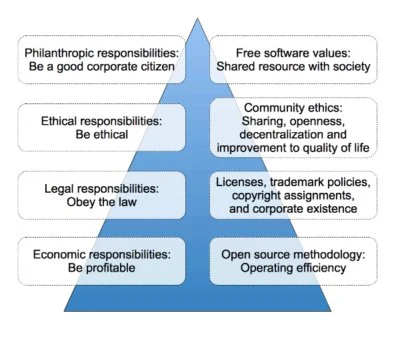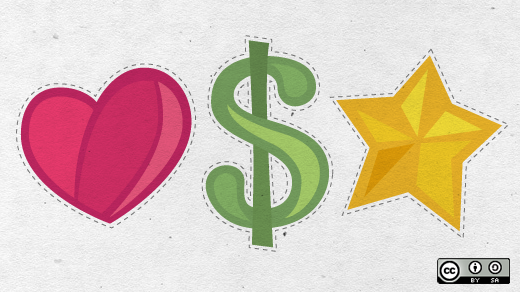Despite the many words written and spoken on the difference between "open source" and "free" software, few people have pointed out that discussion of these differences frequently resembles the debate surrounding the social role of business, which in recent decades has been dominated by the concept of corporate social responsibility (CSR).
The fact of the matter, however, is that organizations committed to open principles could (and should) be reporting their activities—because those activities have effects that are both economic and social. And an analysis of how this is the case might actually help us reconcile two principled positions that have more in common than they might realize.
"Open," "free," and in-between
The term "open source" (as many people know) was coined as merely an instrumental definition, something to clarify the dual meaning of the English word "free" in the term "free software" for the business realm. Both "open source" and "free" describe similar principles, but adherents to each term tend to stand behind views based on fundamentally different values. While "open source" is a practical development methodology focused on making software "better," "free software" is an ethical imperative that pays attention to software users' essential freedoms.
For-profit businesses that develop free and open source software (FOSS) cast their shadows on social life in a way that's similar to non-profit organizations. They're not only creating technically superior products, but also generating a social good. Anyone in the business ethics field will see clear parallels here with the moral management model, wherein business is expected to not only do well at economic and financial levels but also "do good" at social level—doing what is right and fair (at an ethical level), then contributing financial and human resources to the community and improving quality of life (a philanthropic level). In fact, one might even argue that coding and contributing to FOSS development represents a higher stage of CSR because it's not focused on mitigating some set of negative effects of economic activity (as is usually the case). On the contrary, developing FOSS as part of business activity often delivers to society more value than the wealth generated from their profit-generating activities alone.

Figure 1 (CC BY-SA)
Both concepts—"open source" and "free" software—and their associated sets of values could be integrated in different levels of of classical CSR pyramid as seen in Figure 1 above, thus closing the gap between their philosophies. In other words, "open source" values can act as basic building blocks, keys to a development methodology with a high level of operating efficiency. "Free software" values—a commitment to sharing and cooperation in constructing a resource everyone can use and improve, for instance—are the uppermost piece of the pyramid. In the middle of the pyramid, legal responsibilities embody the particular obligations determined by open source license terms and other legal commitments, while ethic responsibilities comprise those activities and practices.
The value of reporting
FOSS projects are not only expected to obey the law as society's codification of acceptable and unacceptable behavior; they are also expected to obey the set of particular rules that are endorsed in their own legal artifacts (i.e., licenses, trademark policies, copyright assignment, and corporate existence). FOSS projects adopt the language of the law to organize their operations, adding a legal layer to the structural sovereignty of these projects. The ethical values of FOSS become the driving force of the legal artifacts that various communities produce; thus, they might reflect standards for behavior more stringent that certain legal frameworks currently require. Their roots are grounded in the values and philosophy that are standard in hacker communities: sharing, openness, decentralization and improvement to quality of life. They get reinforced, too, through these communities' sustained and collaborative code development practices, discussions, and decisions about licenses and project policy.
Open source focus on business performance by stressing practical benefits has often been interpreted as a denial of the ethics of software freedom. However, corporate acceptance of FOSS did not eliminate these foundations. What's more, the success of FOSS in the commercial sphere has the effect of rendering visible these underlying ethics to a broader audience.
How much should FOSS communities care about an academic discussion on the link between coding and social responsibility? It's up to organizations contributing code to assess whether a yearly CSR report, disclosed together with financial statements, is worthwhile. A social responsibility report is an organizational statement that discloses information about economic, environmental, social, and governance performance. Once the relationship between FOSS and social responsibility becomes apparent, organizations can begin analyzing benefits apart from mere reporting. Here the main findings on academic literature about CSR reporting advantages:
- Reporting leads to an increase in the social responsibility of business leaders while establishing social legitimacy. Thus, reporting can change organizational behavior and provide higher economic value through competitive advantage.
- A growing number of organizations are using this sort of non-financial reporting not just as an accountability tool but to drive strategy, unlocking new sources of revenue and growth
- Reporting might also serve as a tool for engaging with stakeholders and their different agendas, approaches, and priorities, which are intrinsic features of a collaborative and open methodology. It limited the likelihood of short-term opportunistic behavior in the project.
- Reporting social responsibility might even have a small effect on on financial performance (e.g., attracting and retaining higher quality employees or socially-aware costumers; allowing for better marketing of products and services; signaling long-term focus on their activities; enhancing corporate reputation; mitigating the likelihood of negative regulatory, legislative, or fiscal action; and attracting financial resources from socially responsible investors).
And just in case none of those benefits are persuasive enough, then note that CSR reporting in no way threatens financial penalties. So, organizations contributing to open source technologies and communities, why not try and formally report your impact on industry and society as a socially responsible activity?






1 Comment